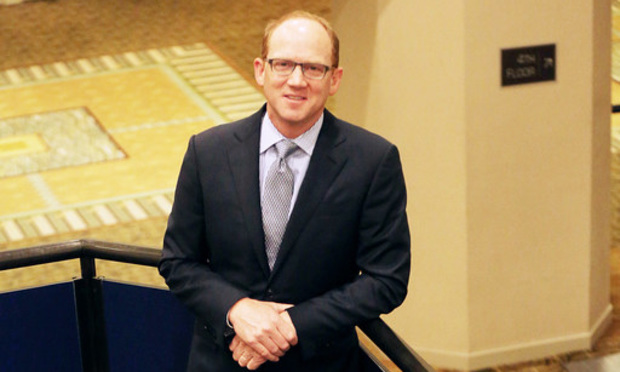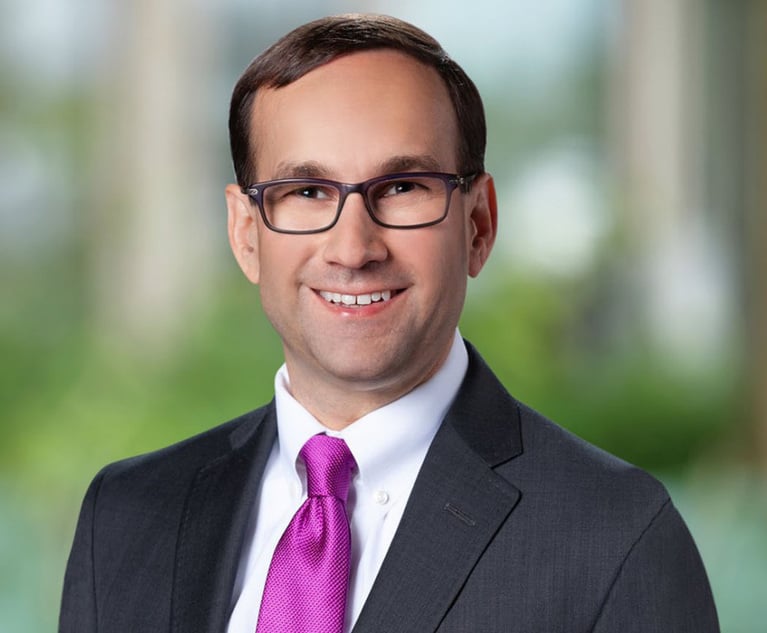Amarin GC Joseph Kennedy Knows Thrill of Victory, and Saving Lives
Kennedy said he joined Dublin-based Amarin as general counsel in 2011 primarily to help secure patents and implement a compliance program as the company awaited U.S. Food and Drug Administration approval of Vascepa, its blockbuster cardiovascular drug.
January 14, 2019 at 05:03 PM
6 minute read
 Joseph Kennedy, executive vice president, general counsel and strategic initiatives, of Amarin Corp. Courtesy photo.
Joseph Kennedy, executive vice president, general counsel and strategic initiatives, of Amarin Corp. Courtesy photo.
Coupling his core background in security law with a pioneering spirit, Amarin Corp. executive vice president and general counsel Joseph Kennedy continues to lead his pharmaceutical company into new frontiers of legal advocacy.
Kennedy said he joined Dublin-based Amarin as general counsel in 2011 primarily to help secure patents and implement a compliance program as the company awaited U.S. Food and Drug Administration approval of its blockbuster cardiovascular drug, Vascepa. Little did he know then that regulatory roadblocks and other challenges would force him to become a legal trailblazer.
After several key legal victories, Kennedy said Amarin has grown in that time from a small company with about 40 employees and no patents to a company in 2019 valued at over $5 billion, with more than 400 sales representatives and “it has rained patents on us.” Amarin announced Jan. 4 that it anticipates a 50 percent growth in net revenue this year.
Corporate Counsel recently talked with Kennedy, who is based in Bedminster, New Jersey, about his career and his victories at Amarin. Here are edited excerpts from that conversation:
Corporate Counsel: Tell me about your background and experience.
Joseph Kennedy: I began my career at the Wall Street law firm Orrick, Herrington & Sutcliffe, where I represented investment banks and developing companies in initial public offerings and mergers and acquisitions. It was a core skill set that served me well.
Prior to Amarin, I served as general counsel of Transcept Pharmaceuticals Inc.; previously I was chief corporate counsel and then acting chief legal officer at Eyetech Pharmaceuticals Inc.; and prior to that vice president and U.S. counsel, corporate business development with Irish drug company Elan Corp. [now part of Irish pharma Perrigo Co.].
CC: What was the most significant legal victory you've won at Amarin?
JK: That would be the August 2015 First Amendment case, in which a federal court ruled that Amarin could engage in truthful and nonmisleading speech to doctors, promoting the off-label use of Vascepa to lower triglycerides and to reduce cardiovascular events. The case ended in a settlement with the U.S. Food and Drug Administration. Prior to that landmark ruling, the FDA did not allow pharmaceutical companies to market off-label uses of their drugs.
I relied on my security law background to find a way to communicate an unapproved drug use accurately and fairly through use of appropriate disclosures. We had a lot of support from doctors, and some even joined in our lawsuit. We're now saving lives and preventing heart attacks and strokes while we wait for the FDA to approve that use of the drug.
CC: You already had won a major victory against the FDA in the same year, right?
JK: Yes, in May 2015 Amarin achieved the first court win against the FDA over its exclusivity determination for what it calls a new chemical entity. The FDA had denied Amarin exclusivity for Vascepa, which is a synthetic product derived from fish oil. We went back and fought them over that, over their interpretation of the law. We pushed the envelope and took the FDA to court in a domain where others have repeatedly lost.
In a technically complex case, Amarin was able to distinguish Vascepa from other fish oil-derived drugs and in 2016 was awarded five years of market exclusivity for Vascepa. In doing so, we reset the rules for regulatory exclusivity for naturally derived products, and provided incentive for other companies to get out there and do what we did: develop new drugs from naturally derived products.
CC: Are there any new or pending legal battles for Amarin?
JK: Yes. We are now before the Federal Circuit on a U. S. International Trade Commission case with a claim against the unlawful importation or sale in the United States of synthetically produced omega-3 products that are sold as dietary supplements. These products are actually unapproved new drugs under the Federal Food, Drug and Cosmetic Act and are unfair competition to Amarin.
And we filed two federal court suits in October in California against two dietary supplement companies that cited the favorable results from our cardiovascular outcomes trial on Vascepa to make [allegedly] false claims about the benefits of their supplements.
CC: Who are the in-house lawyers and the law firms that have worked on all these legal matters?
JK: I've been the lead on all the cases and picked the outside counsel to fit each need. Barbara Kurys, our in-house IP lawyer, played a key role on patent prosecutions and a supporting role in the ongoing International Trade Commission case and the dietary supplement litigation.
For outside counsel, we used Cahill Gordon & Reindel on the First Amendment case. Covington & Burling won the new chemical exclusivity case. And King & Spalding is working on the International Trade Commission and the dietary supplement claims.
CC: Is there anything else you'd like to add?
JK: Every student in law school wants to get involved in something that has meaningful impact in the world. I've had the opportunity to do that and be victorious, defending the U.S. Constitution against the encroachment of government.
And while it's a thrill to chalk up wins against the federal government on issues as important as free speech and drug exclusivity, the greater thrill by far is to know that those victories led to speech that's likely prevented thousands of cardiovascular deaths, heart attacks and strokes, and will continue to do so for years.
This content has been archived. It is available through our partners, LexisNexis® and Bloomberg Law.
To view this content, please continue to their sites.
Not a Lexis Subscriber?
Subscribe Now
Not a Bloomberg Law Subscriber?
Subscribe Now
NOT FOR REPRINT
© 2025 ALM Global, LLC, All Rights Reserved. Request academic re-use from www.copyright.com. All other uses, submit a request to [email protected]. For more information visit Asset & Logo Licensing.
You Might Like
View All
FTC Launches Inquiry of Single-Family Rental Home 'Mega Investors,' Issues PBM Report
5 minute read

Baker Botts' Biopharma Client Sues Former In-House Attorney, Others Alleging Extortion Scheme

People and Purpose: AbbVie's GC on Leading With Impact and Inspiring Change
7 minute readTrending Stories
- 1Trump Administration Faces Lawsuit Over USAID Stop-Work Orders
- 2Legaltech Rundown: Davis Wright Tremaine Announces CodeX Partnership, AAA Brings on Maya Markovich as VP, and More
- 3State Appellate Court Settles Fee Battle Between Former Co-Counsel in Patent Litigation
- 4Recent Controversial Decision and Insurance Law May Mitigate Exposure for Companies Subject to False Claims Act Lawsuits
- 5Visa Revocation and Removal: Can the New Administration Remove Foreign Nationals for Past Advocacy?
Who Got The Work
J. Brugh Lower of Gibbons has entered an appearance for industrial equipment supplier Devco Corporation in a pending trademark infringement lawsuit. The suit, accusing the defendant of selling knock-off Graco products, was filed Dec. 18 in New Jersey District Court by Rivkin Radler on behalf of Graco Inc. and Graco Minnesota. The case, assigned to U.S. District Judge Zahid N. Quraishi, is 3:24-cv-11294, Graco Inc. et al v. Devco Corporation.
Who Got The Work
Rebecca Maller-Stein and Kent A. Yalowitz of Arnold & Porter Kaye Scholer have entered their appearances for Hanaco Venture Capital and its executives, Lior Prosor and David Frankel, in a pending securities lawsuit. The action, filed on Dec. 24 in New York Southern District Court by Zell, Aron & Co. on behalf of Goldeneye Advisors, accuses the defendants of negligently and fraudulently managing the plaintiff's $1 million investment. The case, assigned to U.S. District Judge Vernon S. Broderick, is 1:24-cv-09918, Goldeneye Advisors, LLC v. Hanaco Venture Capital, Ltd. et al.
Who Got The Work
Attorneys from A&O Shearman has stepped in as defense counsel for Toronto-Dominion Bank and other defendants in a pending securities class action. The suit, filed Dec. 11 in New York Southern District Court by Bleichmar Fonti & Auld, accuses the defendants of concealing the bank's 'pervasive' deficiencies in regards to its compliance with the Bank Secrecy Act and the quality of its anti-money laundering controls. The case, assigned to U.S. District Judge Arun Subramanian, is 1:24-cv-09445, Gonzalez v. The Toronto-Dominion Bank et al.
Who Got The Work
Crown Castle International, a Pennsylvania company providing shared communications infrastructure, has turned to Luke D. Wolf of Gordon Rees Scully Mansukhani to fend off a pending breach-of-contract lawsuit. The court action, filed Nov. 25 in Michigan Eastern District Court by Hooper Hathaway PC on behalf of The Town Residences LLC, accuses Crown Castle of failing to transfer approximately $30,000 in utility payments from T-Mobile in breach of a roof-top lease and assignment agreement. The case, assigned to U.S. District Judge Susan K. Declercq, is 2:24-cv-13131, The Town Residences LLC v. T-Mobile US, Inc. et al.
Who Got The Work
Wilfred P. Coronato and Daniel M. Schwartz of McCarter & English have stepped in as defense counsel to Electrolux Home Products Inc. in a pending product liability lawsuit. The court action, filed Nov. 26 in New York Eastern District Court by Poulos Lopiccolo PC and Nagel Rice LLP on behalf of David Stern, alleges that the defendant's refrigerators’ drawers and shelving repeatedly break and fall apart within months after purchase. The case, assigned to U.S. District Judge Joan M. Azrack, is 2:24-cv-08204, Stern v. Electrolux Home Products, Inc.
Featured Firms
Law Offices of Gary Martin Hays & Associates, P.C.
(470) 294-1674
Law Offices of Mark E. Salomone
(857) 444-6468
Smith & Hassler
(713) 739-1250






